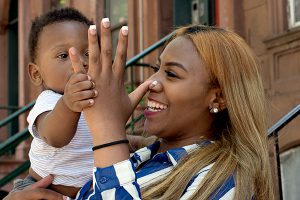BEHAVIORAL HEALTH NEWS
By Colleen Beagen
Bringing wellness into the workplace is a natural development for Odyssey House where the mission of the organization is to promote a healthy recovery for individuals and families facing a range of life challenges from substance use disorders, mental illness, homelessness and chronic medical conditions. In 2011, we introduced a free, voluntary program called R U Fit?! to offer employees the resources they need to improve their own health via education and a supportive work environment.
This staff wellness initiative is a continuation of our commitment to support and promote good health among program participants. It takes a similar positive reinforcement approach to the proven model Odyssey House developed with clients and provides staff with group support, free on-site fitness facilities, and access to an employee-only online health coaching service.
Our objective in implementing a wellness initiative is to help workers make changes in their lives that undermine their health, thereby boosting morale and productivity, improving employee recruitment and retention, and reducing health care costs.
The development of the program was spurred by Odyssey House president, Dr. Peter Provet, who has made wellness a top priority, based on his firm belief that “ultimately, it is the clients we serve who will be the beneficiaries of healthier, happier staff members.
“Given the steep rise in health care costs coupled with increased awareness of the importance of a healthy diet and regular exercise,” he added, “we looked at what we could do to both help staff improve their overall health and impact our bottom line. We found that a program that offered personalized and confidential coaching was a sound investment in our most valuable resource, the 350 counseling, educational, medical, and administrative staff who dedicate themselves to the mission of Odyssey House.”
A survey of American workers backs this up. The survey found that 51 percent of workers agree that having a wellness program encourages them to work harder and perform better at work; 59 percent said they have more energy to be productive; and 43 percent said that they have missed fewer days of work.
Conducted by The Principal Financial Well-Being Index in 2013, the survey further found that the incentive-driven and ease-of-access approach Odyssey House offers – an enhanced program that includes fitness center discounts, on-site prevention screenings, access to health experts, and onsite fitness facilities – is on target with wellness benefits most desired by employees.
Incorporating Wellness Into Company Culture
Fitness has long been a priority at Odyssey House. All staff are encouraged to practice healthy habits at work and have access to exercise equipment at Odyssey House treatment centers. The emphasis on diet and exercise is foremost in a number of events we host, including our annual 5K fundraiser, Run for Your Life, intramural sports leagues, and rigorous training with the Odyssey House Marathon Team (since 2002 more than 400 clients and former clients, staff, board members and other supporters have completed the New York City Marathon).
The purpose of R U FIT?! is to complement these activities with free, online, confidential health coaching and personalized programs to promote weight and nutrition management, encourage regular exercise and stress reduction, and support smoking cessation. All employees who enroll have access to health coaches, agencywide competitions, online workshops and more.
To allay any concerns staff may have about confidentiality and to encourage trust in disclosing personal information, Odyssey House provides these services via an outside company called Health Advocate. Data collected by the service is anonymous and in the aggregate, and only collated to monitor overall participation and refine services.
Each year we offer all staff on-site biometric screenings and confidential consultations with health educators. The screenings measure cholesterol levels, glucose readings, blood pressure and BMI (Body Mass Index). Using their results, employees complete an online Personal Health Profile (PHP), which provides a customized report containing overall wellness scores, identifying high risk areas, and describing steps that can be taken to reduce future health risks. In its first five years, R U Fit?! has contributed to a shift in culture toward a healthier overall lifestyle, and we have seen improvements in the health of our employees. Between 2013 and 2014, we found the following year-over-year improvements for all participating staff:
- 50% improvement in average blood pressure
- 55% improvement in average cholesterol ratio
- 100% improvement in average glucose levels
For employees with at least one risk factor (e.g., BMI over 25, elevated blood pressure, high cholesterol) over the same period:
- 55% improvement in average BMI
- 45% improved average waist circumference
- 70% improvement in average blood pressure
- 75% improvement in average cholesterol
Our goals now are to continue to improve biometrics numbers for high-risk employees; maintain nonrisk employees in the healthy range; increase both participation and engagement in the R U Fit?! program; and expand the stress reduction program.
Sound Bodies, Sound Minds
To aid in managing R U Fit?!, we hired a nutritionist and wellness coordinator to act as a liaison between employees and Health Advocate. A registered dietician and certified Pilates instructor, the coordinator has been instrumental in promoting the program and encouraging staff participation.
She has made it her mission to build a wellness program that expands beyond the standard biometric screenings, gym discounts, health competitions, and cooking workshops. Her first order of business was to build trust with the community of employees that span across 13 locations from downtown Manhattan to the Bronx. By establishing rapport with the employees, the doors of communication were opened and she was able to carry on her mission within the agency.
Our coordinator used her expertise to develop nutrition and exerciserelated initiatives, such as agency-wide competitions like 10,000 steps, Pilates and yoga classes, and lunch and learn seminars. However, due to the fact that depression now costs employers more money than smoking does, she made it a goal to reach employees at a deeper level. Her latest initiatives focus on meditation, mindfulness, yoga and Pilates. She is also planning programs targeting compassion, gratitude, and self-esteem.
Employees often share their stories about how one or more aspects of R U Fit?! helped them in their lives, both professionally and personally. Whether it was the impact a nutrition seminar had on them, the weekly meditation classes, or the free gyms we have at six of our facilities, staff have been able to make changes to their lifestyle and create healthier habits that ultimately lead to a higher quality of life.
 The story of this 100-year-old building is one of realizing potential, learning from the past, and creating a new place of sanctuary. Its story, like those of the people who come here for help with substance abuse and related problems, is also a symbol of endurance and overcoming the odds.
The story of this 100-year-old building is one of realizing potential, learning from the past, and creating a new place of sanctuary. Its story, like those of the people who come here for help with substance abuse and related problems, is also a symbol of endurance and overcoming the odds.





